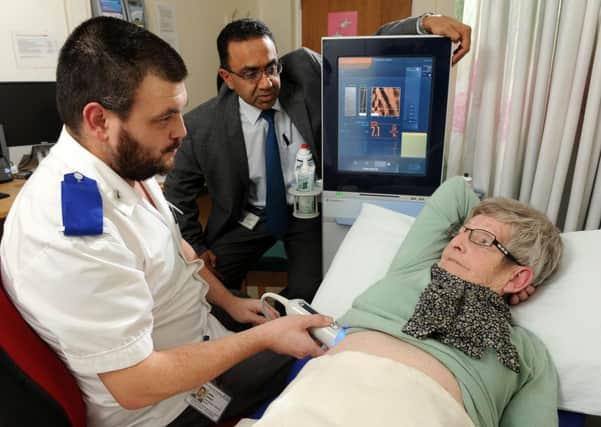Early diagnosis can save lives


Bradford Teaching Hospitals now has a Fibroscan scanner, a potentially lifesaving machine which uses the latest technology to diagnose liver damage.
The addition of the scanner also means the Foundation Trust has become the first in the region to measure fat content in the liver.
Advertisement
Hide AdAdvertisement
Hide Ad“Diagnosing liver disease and damage as early as possible is paramount in giving patients the best chances of recovery,” says Consultant hepatologist, Dr Sulleman Moreea, a committee member of the liver section of the British Society of Gastroenterologists. “Patients can instantly see pictures of the liver and the figures generated by the machine. This can be the incentive they need to change their lifestyles to improve their liver health.”
While all other causes of death are falling, the number of people dying from liver disease is rising, says Dr Moreea. “Currently, most liver damage is caused by excessive alcohol consumption.
“However, in Bradford we are seeing increasing numbers of patients with advanced liver disease from obesity and hepatitis B and C.
“With scarring of the liver (cirrhosis) there is also the risk of developing cancer in the liver. When the liver fails from cirrhosis, patients may require a liver transplant and many patients never receive a new liver because of a shortage of organs. Therefore it is crucial to prevent liver damage from progressing.
Advertisement
Hide AdAdvertisement
Hide Ad“If we detect liver damage early we can treat it more easily so Fibroscan’s introduction is good news for liver patients throughout the district and we will also be taking referrals from around the region.”
Liver disease is the fifth biggest cause of death in England and Wales after heart disease, cancer, stroke and respiratory disease.
There are currently three Fibroscan machines in operation in West Yorkshire in total. The Fibroscan machine works by placing a probe on the patient’s skin which provides immediate, non-invasive information on the state and condition of the liver. By using this method, patients can get a quicker diagnosis and avoid having to undergo an invasive liver biopsy.
Dr Moreea said: “Up to now we have used liver biopsies to determine the nature and extent of liver disease. A biopsy is time consuming as patients have to spend the day in hospital having blood tests, and it needs to be carried out by an expert radiologist after the skin is injected with local anaesthetic, carrying a risk of discomfort and a smaller risk of internal bleeding. However, the Fibroscan is a completely painless and non-invasive procedure which can be completed in 15 minutes in our outpatient department.
Advertisement
Hide AdAdvertisement
Hide Ad“While the Fibroscan machine does not replace a liver biopsy in every situation, in the future we hope it will replace the need for a biopsy in a substantial number of our liver cases. ”
Dr Moreea estimates that 20 per cent of Bradford patients should no longer need a biopsy.
The Fibroscan, which cost £85,000, uses ultrasound waves to help measure liver stiffness, a marker of liver disease.
Whereas other hospitals in Yorkshire have a similar machine, Bradford is the first centre to have the added benefit of being able to measure the quantity of fat in the liver and the damage it does to the liver.